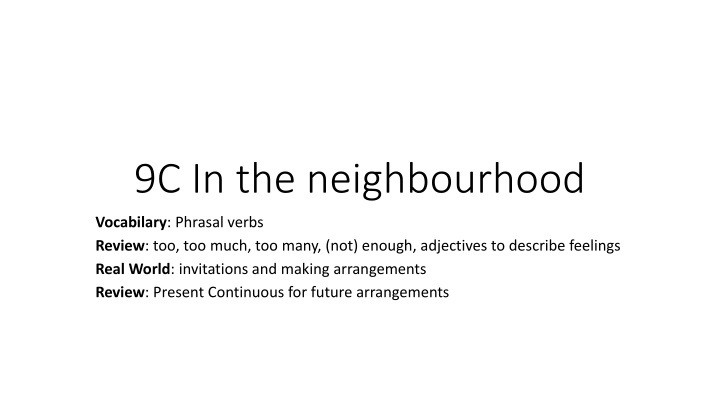
Neighbourhood Vocabulary and Making Arrangements Review
Enhance your English skills with a focus on phrasal verbs, vocabulary related to feelings, making arrangements, and handling invitations. Explore scenarios related to neighbourhood issues and practising Present Continuous for future plans. Dive into exercises and new vocabulary to strengthen your understanding.
Download Presentation

Please find below an Image/Link to download the presentation.
The content on the website is provided AS IS for your information and personal use only. It may not be sold, licensed, or shared on other websites without obtaining consent from the author. If you encounter any issues during the download, it is possible that the publisher has removed the file from their server.
You are allowed to download the files provided on this website for personal or commercial use, subject to the condition that they are used lawfully. All files are the property of their respective owners.
The content on the website is provided AS IS for your information and personal use only. It may not be sold, licensed, or shared on other websites without obtaining consent from the author.
E N D
Presentation Transcript
9C In the neighbourhood Vocabilary: Phrasal verbs Review: too, too much, too many, (not) enough, adjectives to describe feelings Real World: invitations and making arrangements Review: Present Continuous for future arrangements
Please, open your books, p. 72 and try to do exercise 1 Who are your neighbours? What are they like? Do you have any problems with them? Now, please read the letter and anwer the questionsin exercise 2 Below, you can find help with new vocabulary Move in start living in a new home Get on with like someone and be friendly to him/her Sit down be standing and then sit in a chair Put up with tolerate Give up stop doing Go away leave a place Go on continue Turn up - arrive at a place Go back return Take off remove Do exercise 4 on the page 72.
Now, lets practice Now, let s practice Think about the problems in your neighbourhood. Make eight sentences with too, too much, too many, (not) enough Describe how you feel about them Below, you can find words/phrases to help you with your ideas traffic, cinemas, places for children to play, places to park, noise at night, trains, buses, pollution, rubbish, dogs, late-night bars, good schools, parks, sports centres, police
Invitations and making suggestions Asking about people s arrangements Asking about people s arrangements (We use Present Continuous): : What are you doing on Tuesday? Are you doing anything next Friday? But: Are you free on Wednesday? (to be state verb) Inviting someone to do something Inviting someone to do something Would you like to come? (infinitive with to is used after Would you like...) Why don t we meet for a drink? (infinitive is used after Why don t we...) Saying yes or no Saying yes or no Yes, I d love to. I d love to, but I can t. Yes, that d be great. Arranging a time and a place Arranging a time and a place Where/what time shall we meet? How abot six thirty? Now, let s revise. Do exercise 4, p.74 in Student s book, and exercise 1/2, lesson 9D, Workbook
Present Continuous for future arrangements Present Continuous for future arrangements English speakers often use the Present Continuous Tense (subject + 'be' = verb-ing) to talk about future arrangements future arrangements. A future arrangement future arrangement is a plan that you have decided and organised with another person. I'm spending I'm spendingChristmas and New Year with my Mum and Dad. We're meeting We're meetingSusan at 3 o'clock tomorrow afternoon. Sometimes the arrangement is between a person and a group of people an organisation organisationor company company: group of people, or I'm working I'm working over the New Year. (this arrangement is between Alice and her employer) They are flying They are flying to New York tomorrow morning. (they have made this arrangement with the airline) It is not always necessary to state who the arrangement is with. For example, Tim says: So what are we all doing what are we all doingat Christmas? I'm popping over to I'm popping over to Poland for a few days. I'm looking forward to I'm looking forward to a nice cosy Christmas. For more information on Present Continuous for future arrangements Present Continuous for future arrangements please visit https://learnenglishkids.britishcouncil.org/grammar-practice/present-continuous-future- arrangements
9 Review Please, open your books, p. 75 Try to do exercise 1 (cross out the incorect word/phrase) Try to do exercise 2 (fill in the gaps with the correct form of the verbs in brackets) Try to do exercise 3 (cross out the incorect word/phrase) Try to do exercise 4 (complete the sentences about today s world) Try to do exercise 5 (complete the phrasal verbs with the particles) Thank you for your attention! #Stay positive! #Stay healthy! #Stay home! Lecturer Ivana Mila i ivana.milacic@udg.edu.me
